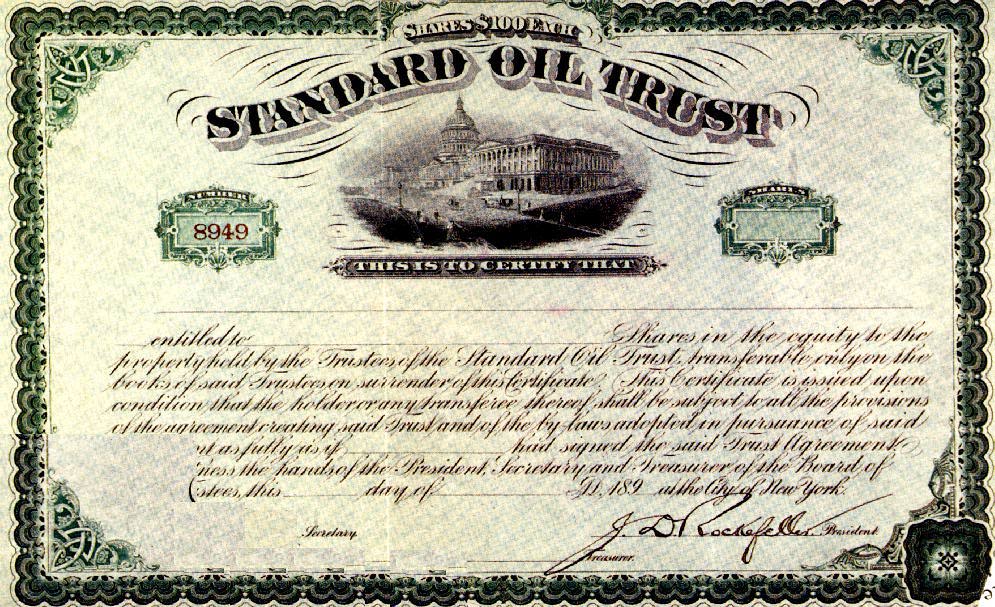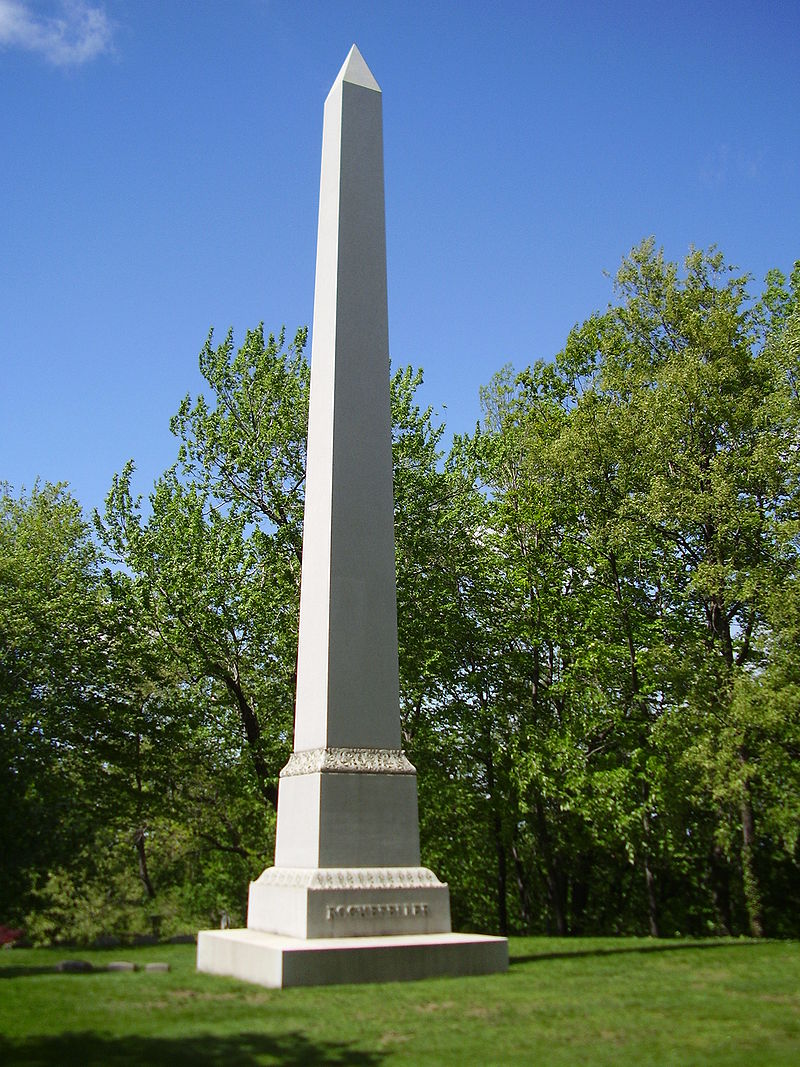
Early Life
John D. Rockefeller was born into a large family in Richford, New York, to con artist William Avery "Bill" Rockefeller and Eliza Davidson. He had five siblings (3 younger brothers, an older sister, and a younger sister). His father was English and German, and his mother was of Ulster Scot descent (Irish and Scottish descent. Rockefeller's father was a known con artist who would often vanish for months at a time. His father taught him to always get the better part of any deal. After moving to Moravia, New York, and then to Owego, New York, and then to Strongsville, Ohio, and then finally Cleveland, Ohio. In Ohio, Rockefeller tookk a ten-week business course at Folsom's Commercial College, where he studied bookkeeping. He also had a deep love for music and even dreamt of it as a possible career.

Career before Standard Oil
In September 1855, whem Rockefeller was 16, he got his first job as an assistant bookkeeper working for a small produce commission firm in Cleveland called Hewitt & Tuttle. He worked long hours and was uniquely adept at calculating transportation costs. Much of his job included negotiating with barge canal owners, ship captains, and freight agents. He learned that the posted transportation rates that everyone believed were fixed could actually be altered depending on conditions and timing of freight. He was also instructed to collect debts by Hewitt at times. Rockefeller received $16 a month for his three-month aprenticeship. This later was increased to $31 a month his first year, $50 per month the next year, and then finally $58 a month.

Buisness Partnership
In 1859, Rockefeller went into the produce commission business with a partner, Maurice B. Clark, and they raised $4,000 in capital. (roughly $113,822 when adjusted for inflation). Clark inititated the idea of the partnership and offered $2,000 towards the goal. Rockefeller only had $800 at the time and so he borrowed $1,000 from his father at 10% interest rate. Profits skyrocketed during the outbreak of the Civil War when the Union Army called for massive amounts of food ans supplies. Rockefeller & Clark looked towards the refining of crude oil as the war edged towards an end.

Civil War Service
While his brother Frank fought in the Civil War, Rockefeller tended his business and hired substitute soldiers. He gave money to the Union cause, as did many rich Northerners who avoided combat. “I wanted to go in the army and do my part,” Rockefeller said. “But it was simply out of the question. There was no one to take my place. We were in a new business, and if I had not stayed it must have stopped—and with so many dependent on it.” Rockefeller was an abolitionist who voted for President Abraham Lincoln and supported the then-new Republican Party. A market existed for the refined oil in the form of kerosene. The price of the refined oil in 1863 was around $13 a barrel, with a profit margin of around $5 to $8 a barrel. In this environment of a wasteful boom, the partners switched from foodstuffs to oil, building an oil refinery in 1863 in "The Flats", then Cleveland's burgeoning industrial area. The refinery was directly owned by Andrews, Clark & Company, which was composed of Clark & Rockefeller, chemist Samuel Andrews, and M. B. Clark's two brothers. While other refineries would keep the 60% of oil product that became kerosene, but dump the other 40% in rivers and massive sludge piles, Rockefeller remained as thrifty and efficient as ever, using the gasoline to fuel the refinery, and selling the rest as lubricating oil, petroleum jelly and paraffin wax, and other by-products. In February 1865, Rockefeller bought out the Clark brothers for $72,500 (equivalent to $1 million in 2019 dollars) at auction and established the firm of Rockefeller & Andrews. Rockefeller said, "It was the day that determined my career." He was well-positioned to take advantage of postwar prosperity and the great expansion westward fostered by the growth of railroads and an oil-fueled economy. He borrowed heavily, reinvested profits, adapted rapidly to changing markets, and fielded observers to track the quickly expanding industry.

Standard Oil
By the end of the Civil War, Clevaland was one of the five main refining centers in the U.S., and in 1869 there was triple the kerosene refining capacity than needed to supply the market. On January 10, 1870, Rockefeller abolished the partnership of Rockefeller, Andrew & Flagler, forming Standard Oil of Ohio. Rockefeller quickly expanded the company to be the most profitable refiner in Ohio. Likewise, it became one of the largest shippers of oil and kerosene in the country. Before 1870, oil light was only for the wealthy, provided by expensive whale oil. During the next decade kerosene became commonly available to the working and middle classes. Rockefeller continued with his self-reinforcing cycle of buying the least efficient competing refiners, improving the efficiency of his operations, pressing for discounts on oil shipments, undercutting his competition, making secret deals, raising investment pools, and buying rivals out. In less than 4 months in 1872, Standard Oil absorbed 22 of its 26 Cleveland competitors; this was later known as "The Cleveland Conquest" or "The Cleveland Massacre". He later became business partners with his bigest antagonist company, Pratt and Rogers. For many competitors, Rockefeller just had to show his books so they could see what they're against and then give them a decent offer. Most accepted this deal, but if not he told them he would run them into bankruptcy and then cheaply buy up their assets at auction. Rockefeller saw himself as the industry's savior, "an angel of mercy" absorbing the weak and making the industry as a whole stronger, more efficient, and more competitive. It added its own pipelines, tank cars, and home delivery network. It kept oil prices low to stave off competitors, made its products affordable to the average household, and, to increase market penetration, sometimes sold below cost. It developed over 300 oil-based products from tar to paint to petroleum jelly to chewing gum. By the end of the 1870s, Standard was refining over 90% of the oil in the U.S. Rockefeller had already become a millionaire(equivalent to $26 million in 2019 money)

Monopoly
Although it always had hundreds of competitors, Standard Oil gradually gained dominance of oil refining and sales as market share in the United States through horizontal integration, ending up with about 90% of the US market. In the kerosene industry, the company replaced the old distribution system with its own vertical system. It supplied kerosene by tank cars that brought the fuel to local markets, and tank wagons then delivered to retail customers, thus bypassing the existing network of wholesale jobbers. Despite improving the quality and availability of kerosene products while greatly reducing their cost to the public (the price of kerosene dropped by nearly 80% over the life of the company), Standard Oil's business practices created intense controversy. The firm was attacked by journalists and politicians throughout its existence, in part for these monopolistic methods, giving momentum to the antitrust movement. By 1880, according to the New York World, Standard Oil was "the most cruel, impudent, pitiless, and grasping monopoly that ever fastened upon a country". To critics Rockefeller replied, "In a business so large as ours ... some things are likely to be done which we cannot approve. We correct them as soon as they come to our knowledge." At that time, many legislatures had made it difficult to incorporate in one state and operate in another. As a result, Rockefeller and his associates owned dozens of separate corporations, each of which operated in just one state; the management of the whole enterprise was rather unwieldy. In 1882, Rockefeller's lawyers created an innovative form of corporation to centralize their holdings, giving birth to the Standard Oil Trust. The "trust" was a corporation of corporations, and the entity's size and wealth drew much attention. Nine trustees, including Rockefeller, ran the 41 companies in the trust. The public and the press were immediately suspicious of this new legal entity, and other businesses seized upon the idea and emulated it, further inflaming public sentiment. Standard Oil had gained an aura of invincibility, always prevailing against competitors, critics, and political enemies. It had become the richest, biggest, most feared business in the world, seemingly immune to the boom and bust of the business cycle, consistently making profits year after year. The big corporations such as Standard Oil made large contributions to McKinley's presidential campaign. Its share of world oil refining topped out above 90% but slowly dropped to about 80% for the rest of the century. Despite the formation of the trust and its perceived immunity from all competition, by the 1880s Standard Oil had passed its peak of power over the world oil market. Rockefeller finally gave up his dream of controlling all the world's oil refining.

Late Life & Death
In his 50s Rockefeller suffered from moderate depression and digestive troubles; during a stressful period in the 1890s he developed alopecia, the loss of some or all body hair. By 1901 he began wearing toupées. His hair never grew back, but other health complaints subsided as he lightened his workload. Rockefeller died of arteriosclerosis on May 23, 1937, less than two months shy of his 98th birthday, at "The Casements", his home in Ormond Beach, Florida. He was buried in Lake View Cemetery in Cleveland.